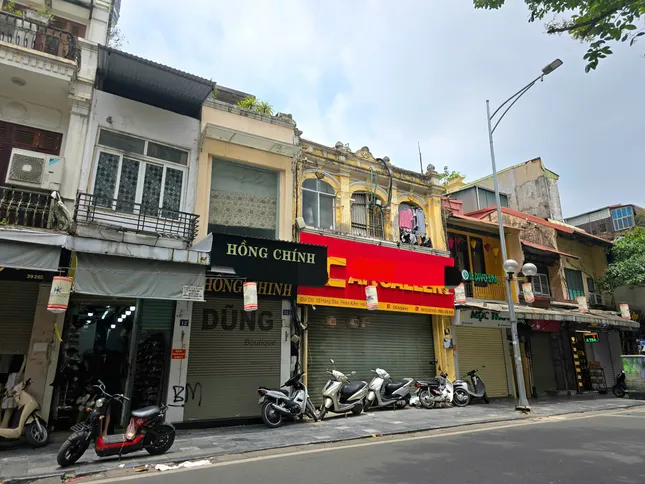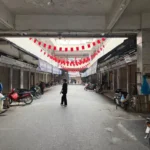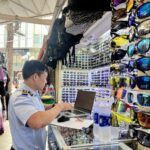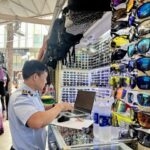Shutting Down to ‘Observe’
According to Tien Phong newspaper’s investigation, many business households are currently confused about the new tax policies and product origin identification.
Ms. Thuong, a shop owner on Hang Dao street, shared that she has temporarily closed her business since June 2nd and only sells to a few regular customers occasionally. The reason for this closure is to undergo the procedure for issuing electronic invoices through a sales machine. Traditionally, her shop used to issue handwritten invoices, but now they have to adapt to using modern equipment.
Another reason for the closure, not only for Ms. Thuong but also for many clothing businesses on Hang Ngang and Hang Dao streets, is the origin of their goods. Their products are sourced from both domestic garment factories and China. Only large factories can provide valid input invoices, while goods from China only come with regular retail invoices. Therefore, it is “mandatory” to shut down during this period to standardize their invoices and documents.
According to some business households on Hang Ngang, Hang Dao, and Luong Van Can streets, they will work on completing their tax procedures while also observing the situation before reopening their businesses. Basically, they plan to reopen after the peak period of the campaign against counterfeit and pirated goods, which ends on June 15th.
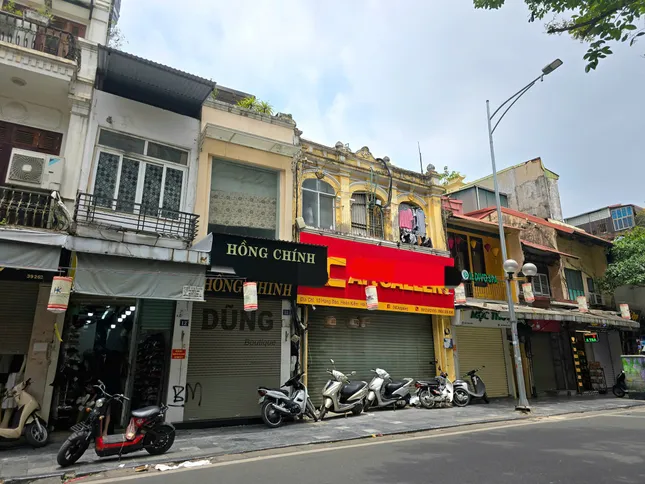
The scene of multiple closed shops on Hang Dao street, Hoan Kiem district.
Ms. H., a restaurant owner in Hai Ba Trung district, is also facing challenges with input invoices.
According to Ms. H., her restaurant has been sourcing vegetables, meat, and fish from local markets like Cho Nguyen Cong Tru and Cho Hom. Now, when issuing invoices to individual customers through a computer, she has to standardize the input invoices, but the suppliers from these markets can only provide handwritten ones, which are not accepted by the tax authority.
“Currently, the restaurant accepts both cash and bank transfers. However, in the long run, it is difficult to continue the business as we may be penalized if inspected by the tax authority,” Ms. H. shared her concerns.
What’s the Solution for Business Households?
To combat smuggling, commercial fraud, and counterfeit goods, the Hanoi People’s Committee issued Decision 2664/QD-UBND on May 27, 2025, establishing a task force led by Chairman Tran Sy Thanh. This task force is responsible for overseeing the peak inspection period from May 15 to June 15, aiming to prevent counterfeit and pirated goods and protect intellectual property rights.
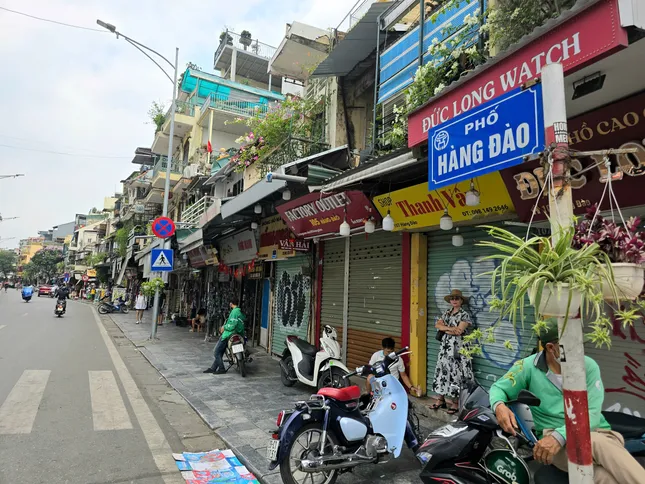
The quiet business scene on Hang Dao street on June 7th.
However, as mentioned earlier, many business households are waiting for this peak inspection period to pass before reopening, aiming to avoid inspections and penalties.
Tax Area I Authority (covering Hanoi and Hoa Binh) advises business households and individuals to stay calm, understand the legal regulations, and not follow illegal practices such as concealing revenue or lacking transparency in economic transactions. They should also properly and fully declare their revenue when selling goods and services.
“For taxpayers who intentionally conceal revenue or make untrue or incomplete tax declarations, there will be consequences such as tax arrears collection, tax declaration errors, tax evasion penalties, or even criminal liability,” warned Tax Area I Authority.
Commenting on the phenomenon of some business households avoiding taxes by using cash transactions, Dr. Mac Quoc Anh, Vice Chairman of the Hanoi Small and Medium Enterprise Association, said: “This creates an unfair competitive environment. Formal enterprises have to pay full taxes, while individual households can avoid taxes, leading to lower costs and unfair competition. It also reduces budget revenues, creates an opaque business environment, and hinders the modernization of the economy due to difficulties in money tracing, credit policies, and fraud management.”
Dr. Quoc Anh attributed this to the “fear of growing up” among business households, as they worry about compliance costs and legal risks. The transition from individual households to enterprises is still limited, so he suggested that the government simplify tax and accounting procedures for micro-enterprises. He also recommended providing financial and legal incentives for newly transformed enterprises and utilizing digital technology to reduce compliance costs.
The Great Shutdown of Dong Xuan Market Stalls: Unveiling the Unexpected Truth
The bustling marketplace of Dong Xuan in Hanoi’s Hoan Kiem district has witnessed a notable transformation. In recent times, an astonishing 630 out of 2,200 businesses chose to shut their doors, marking a significant shift in this vibrant commercial hub.
“Unleashing the Private Sector: Businesses Await Feasible Mechanisms and Tailored Policies.”
The issuance of Resolution 68-NQ/TW by the Political Bureau to promote the private economic sector, followed by specific action plans and mechanisms from the Government and the National Assembly, has been hailed as a groundbreaking move by the business community. The focus now shifts to translating these initiatives into tangible and feasible policies, thereby providing a significant boost to the private sector’s growth and development.
Counterfeit and Substandard Products Flood the Market: What Does the Consumer Rights Protection Association Have to Say?
The proliferation of counterfeit goods on social media, e-commerce platforms, and large markets is a direct consequence of lax regulations and inadequate deterrents.

























